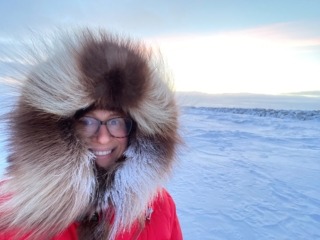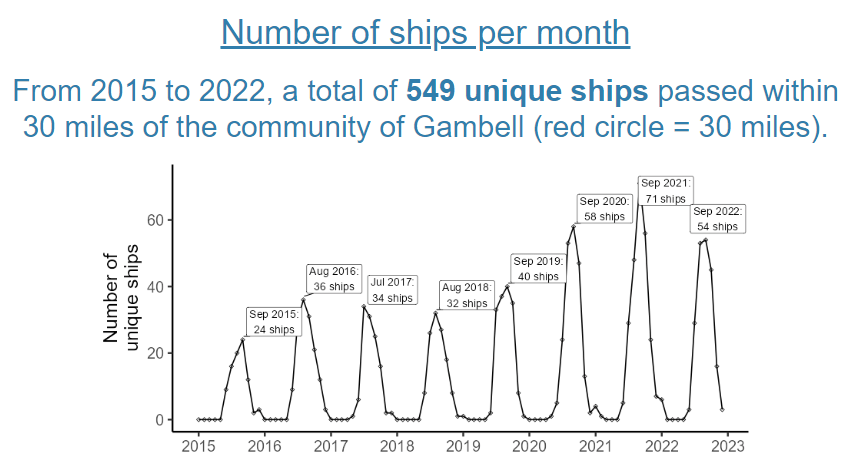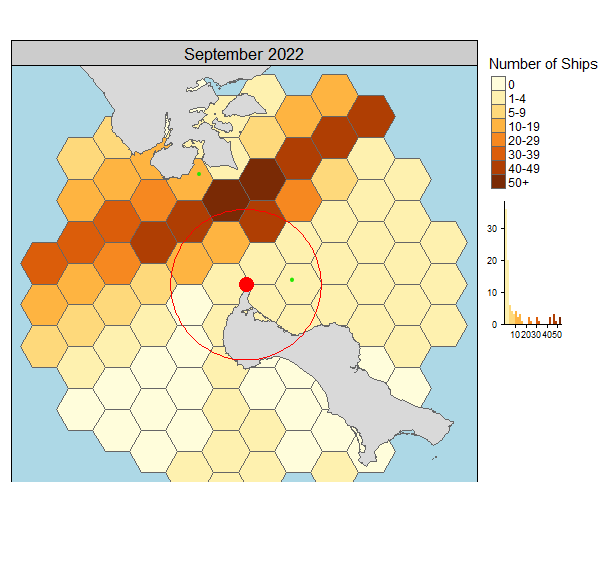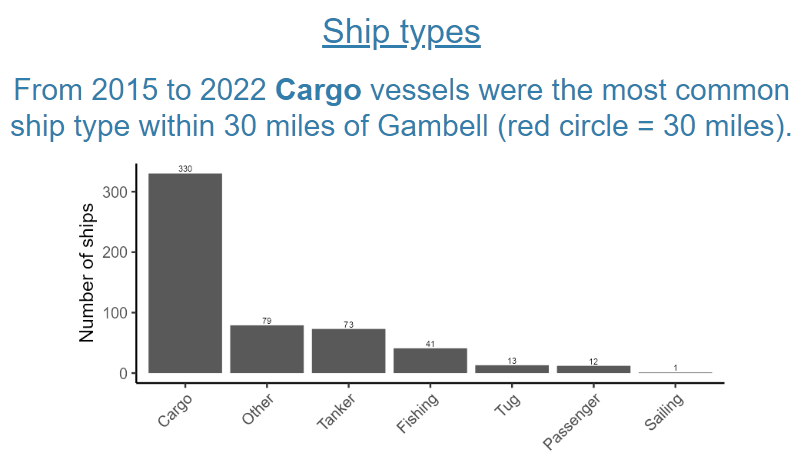MARINE PROGRAM
CONTACT INFORMATION



Marine Program
Kawerak was awarded funds from The Oak Foundation and The Pew Charitable Trusts to address potential impacts related to increased marine shipping on individuals, subsistence resources and the environment within our region. Numerous tribal, environmental, state, federal, and international interests have undertaken action and discussions to address the impacts of global climate change and increased marine shipping in the Arctic. Arctic marine transits have increased in the last decade through ice free Arctic waters to transport resources and people from all parts of the globe. Kawerak must engage in these important discussions due to the potential impacts to our way of life. Subsistence resources, the environment, and culture are vital aspects of Alaska’s first people and the public at large. Kawerak’s Marine Program will advocate for local priorities and propose actions to minimize negative impacts of increased shipping in the Bering and Chukchi Seas.

Anna Rose MacArthur, Marine Advocate
Arctic Watch
Arctic Watch is an effort to build a sea traffic management system in the Bering Strait. Arctic Watch would direct vessels in real time on the safest and most efficient routes to keep vessels, communities, and wildlife safe.Increasing amount of marine vessel traffic through the Bering Strait is a high concern for our region’s Tribes and Tribes want more information about this vessel traffic and influence over it. For these reasons, Kawerak is partnering with a group of organizations to develop Arctic Watch, and will design the project in collaboration with Tribes to meet the needs of the region.
View Live Vessel Tracking at ArcticWatch.org
Download Instructions on how to view Live Vessel Tracking and to sign up for Community Alerts:
https://kawerak.org/download/how-to-access-live-vessel-data-traffic-in-bering-strait/?tmstv=1765470844
View the copy of the report from the January 2024 meeting below or download it: https://kawerak.org/wp-content/uploads/2025/05/250429-Arctic-Watch-Jan-2024-Workshop-Report-vFINAL-8.75×11.25-NEW-map-LR.pdf
Resources & Documents
Emergency Contact Information |
|
| US Coast Guard, National Response Center (Oil spill/chemical spill/maritime security) |
1-800-424-8802 |
| USCG, Maritime emergency in State | 1-800-478-5555 or 1-888-399-5555 |
| Maritime emergency Nationwide & International | 1-907-463-2000 |
| Emergency VHF-FM | Channel 16 |
| Emergency HF | 2183.4 (2182) and 4126.4 (4125) |
| Telex | 496115066 |
| Easylink | 62907427 |
| State of Alaska, Department of Homeland Security and Emergency Management (Protect lives and property from terrorism and all other hazards) |
1-907-428-000, 1-877-242-5643 |
| State of Alaska, Alaska State Troopers – Nome Search & Rescue |
1-907-443-2835 |
| Port of Nome | 1-907-443-6619 |
| Capt of the Port, Western Alaska | 1-907-428-4200 |
| USCG Homeland security – Radio information for boaters (incl. frequencies) | http://www.navcen.uscg.gov/?pageName=mtBoater |
| NOAA NMFS (Marine mammal stranding) | 1-877-925-7773 |
Vessel Traffic Data for Communities
Wondering what kinds of ships are passing near your community? Feel free to reach out to Kelly Kapsar – she is a researcher using satellite data to look at the Bering Strait region. Kelly is happy to provide free reports of historic ship traffic from 2015-2022 in and around any coastal community of the Bering Strait. She’s also eager to learn more about what community members are seeing on the ground and how that compares to what she is seeing from satellites. You can reach her by email at Kelly.kapsar@gmail.com to get a copy of a report for your community or share any ideas or questions you may have.
Here is an example of data created for the community of Gambell:
Marine Program
Kawerak was awarded funds from The Oak Foundation and The Pew Charitable Trusts to address potential impacts related to increased marine shipping on individuals, subsistence resources and the environment within our region. Numerous tribal, environmental, state, federal, and international interests have undertaken action and discussions to address the impacts of global climate change and increased marine shipping in the Arctic. Arctic marine transits have increased in the last decade through ice free Arctic waters to transport resources and people from all parts of the globe. Kawerak must engage in these important discussions due to the potential impacts to our way of life. Subsistence resources, the environment, and culture are vital aspects of Alaska’s first people and the public at large. Kawerak’s Marine Program will advocate for local priorities and propose actions to minimize negative impacts of increased shipping in the Bering and Chukchi Seas.

Anna Rose MacArthur, Marine Advocate
Arctic Watch
Arctic Watch is an effort to build a sea traffic management system in the Bering Strait. Arctic Watch would direct vessels in real time on the safest and most efficient routes to keep vessels, communities, and wildlife safe.Increasing amount of marine vessel traffic through the Bering Strait is a high concern for our region’s Tribes and Tribes want more information about this vessel traffic and influence over it. For these reasons, Kawerak is partnering with a group of organizations to develop Arctic Watch, and will design the project in collaboration with Tribes to meet the needs of the region.
View Live Vessel Tracking at ArcticWatch.org
Download Instructions on how to view Live Vessel Tracking and to sign up for Community Alerts:
https://kawerak.org/download/how-to-access-live-vessel-data-traffic-in-bering-strait/?tmstv=1765470844
View the copy of the report from the January 2024 meeting below or download it: https://kawerak.org/wp-content/uploads/2025/05/250429-Arctic-Watch-Jan-2024-Workshop-Report-vFINAL-8.75×11.25-NEW-map-LR.pdf
Resources & Documents
Emergency Contact Information |
|
| US Coast Guard, National Response Center (Oil spill/chemical spill/maritime security) |
1-800-424-8802 |
| USCG, Maritime emergency in State | 1-800-478-5555 or 1-888-399-5555 |
| Maritime emergency Nationwide & International | 1-907-463-2000 |
| Emergency VHF-FM | Channel 16 |
| Emergency HF | 2183.4 (2182) and 4126.4 (4125) |
| Telex | 496115066 |
| Easylink | 62907427 |
| State of Alaska, Department of Homeland Security and Emergency Management (Protect lives and property from terrorism and all other hazards) |
1-907-428-000, 1-877-242-5643 |
| State of Alaska, Alaska State Troopers – Nome Search & Rescue |
1-907-443-2835 |
| Port of Nome | 1-907-443-6619 |
| Capt of the Port, Western Alaska | 1-907-428-4200 |
| USCG Homeland security – Radio information for boaters (incl. frequencies) | http://www.navcen.uscg.gov/?pageName=mtBoater |
| NOAA NMFS (Marine mammal stranding) | 1-877-925-7773 |
Vessel Traffic Data for Communities
Wondering what kinds of ships are passing near your community? Feel free to reach out to Kelly Kapsar – she is a researcher using satellite data to look at the Bering Strait region. Kelly is happy to provide free reports of historic ship traffic from 2015-2022 in and around any coastal community of the Bering Strait. She’s also eager to learn more about what community members are seeing on the ground and how that compares to what she is seeing from satellites. You can reach her by email at Kelly.kapsar@gmail.com to get a copy of a report for your community or share any ideas or questions you may have.
Here is an example of data created for the community of Gambell:



